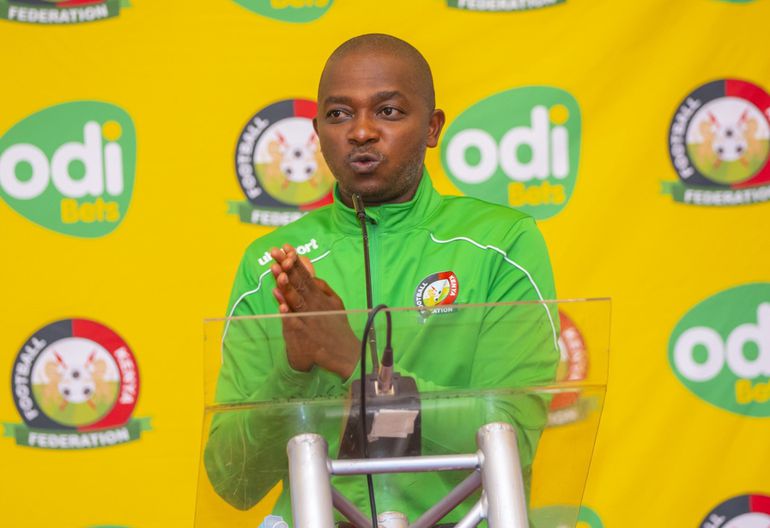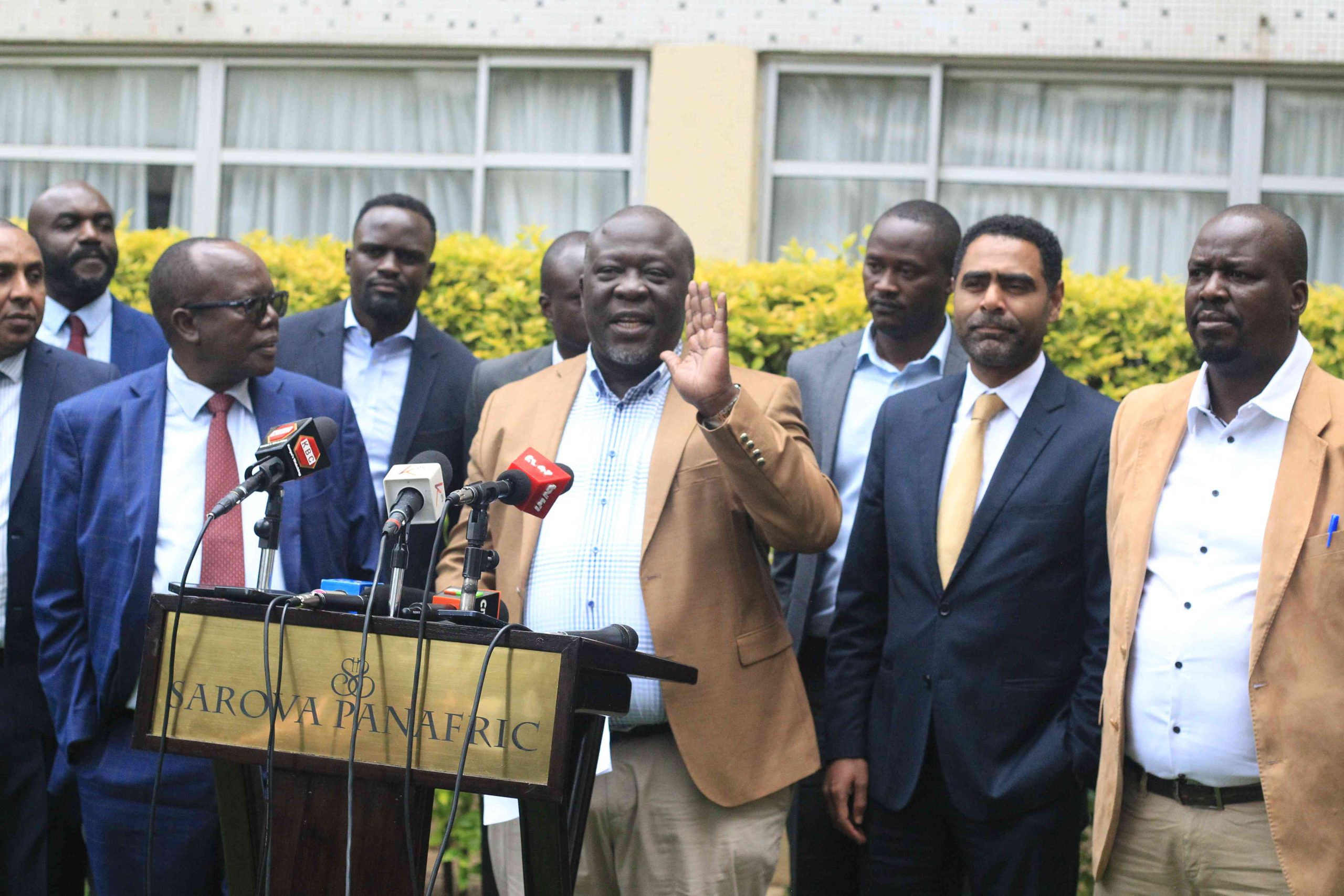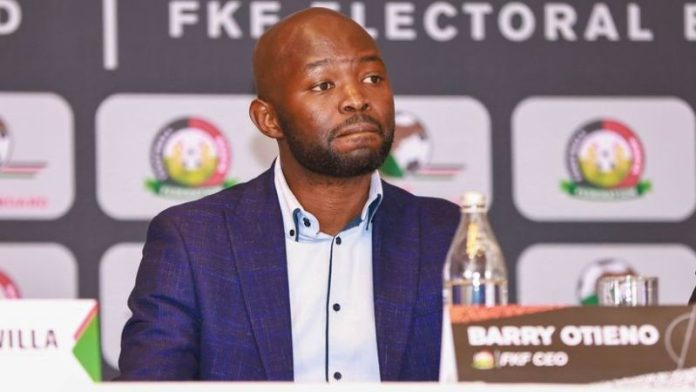In a major shakeup within the Football Kenya Federation (FKF), Barry Otieno has officially stepped down from his position as CEO, a role he held since 2019. The news, confirmed late last week, has sent ripples through Kenya’s football community, raising speculation that Otieno may be gearing up to contest for FKF’s top seat in the upcoming elections.
Otieno’s departure comes at a critical time for the FKF, with elections just around the corner. As the federation prepares for a new leadership cycle, his resignation not only opens the door for fresh leadership but also hints at a strategic move that could reshape FKF’s future.
The Reason Behind Otieno’s Resignation
Appointed as FKF CEO in 2019 after the controversial removal of his predecessor, Robert Muthomi, Otieno has been a prominent figure in the federation’s activities. When asked about his decision to resign, Otieno cited “work-related pressure” as the primary reason. “I’ve stepped down to take a break from the demanding nature of the position. There’s speculation about me running for office, but nothing is confirmed,” Otieno stated when contacted.
His statement leaves room for interpretation, and sources close to the federation suggest that Otieno is seriously considering a run for the FKF presidency. His move aligns with the FKF election timeline, adding fuel to the speculation that his resignation is part of a larger strategy to launch his candidacy.
Absence at Key FKF Meeting Raises Questions
Otieno’s absence from a crucial FKF meeting over the weekend has further heightened the rumors surrounding his potential campaign. FKF President Nick Mwendwa, who is seeking a third term amid controversy, convened with 40 branch officials from across Kenya in an attempt to rally support for his bid. Otieno’s no-show at the event has not gone unnoticed, with many questioning his loyalty and future intentions.
As FKF’s top leadership gears up for what is expected to be one of the most hotly contested elections in recent years, Otieno’s decision to resign at this pivotal moment could be a calculated move. The stakes are high, and his candidacy would undoubtedly shake up the race, given his close ties to Mwendwa and the influence he has built over the years.
Mwendwa’s Controversial Third Term Bid
Nick Mwendwa, the current FKF President, is no stranger to controversy. His pursuit of a third term in office has sparked debate, with critics arguing that it undermines the principles of democracy within the federation. Despite the backlash, Mwendwa remains determined, scheduling more meetings with club officials this week to secure support ahead of the elections.

Mwendwa’s strategy hinges on consolidating backing from FKF’s various stakeholders, including branch officials and club representatives. His focus is to solidify his base before the elections kick off on November 9 at the branch level, progressing to national elections on December 7. Mwendwa’s third-term bid has intensified the political atmosphere within the FKF, and Otieno’s potential entry into the race would further complicate Mwendwa’s path to re-election.
ALSO READ:
- FKF President Nick Mwendwa Announces Controversial Bid for a Third Term in Office
- Nyamweya Declares Candidacy for FKF Presidency: Aiming to Revamp Kenyan Football
- 5 FKF presidential aspirants call for electoral transparency amid allegations of voter register tampering
- FKF Electoral Board Responds to Concerns, Promises Free and Fair Elections Amid Candidate Criticism
Who Are the Other Contenders?
The FKF election race is set to be a fiercely competitive contest, with several candidates already declared and more expected to join. Alongside Barry Otieno, other notable names vying for the top seat include Hussein Mohammed, Tom Alila, and former FKF President Sam Nyamweya. Each of these contenders brings a unique set of credentials and support bases, making it a diverse and unpredictable race.
Hussein Mohammed, a respected figure in Kenyan football, has positioned himself as a reformist candidate, advocating for transparency and accountability within the federation. Tom Alila, with his deep ties to grassroots football, offers a platform that prioritizes the development of local talent and infrastructure. Meanwhile, Sam Nyamweya’s return to the race introduces a familiar face, as he seeks to reclaim his position after a controversial exit.
The diversity of candidates and their distinct platforms create a dynamic election environment that could shift the power balance within the FKF. Barry Otieno’s possible entry adds an element of intrigue, as his insider knowledge and close relationship with Mwendwa could prove pivotal in his campaign.

What’s Next for FKF?
As FKF’s election process gains momentum, the federation faces a critical juncture that could redefine its leadership and strategic direction. With the election timeline beginning on November 9 at the branch level and culminating in national elections on December 7, the stakes are higher than ever for candidates and the FKF’s future.
Barry Otieno’s resignation, whether purely for personal reasons or as a strategic move for higher ambitions, is a development that will shape the course of FKF politics in the coming months. Should he decide to run, his candidacy will undoubtedly challenge Mwendwa’s bid for a third term and could even split the vote among delegates who have supported Mwendwa’s administration thus far.
In the meantime, all eyes are on Otieno as the football community awaits his next move. If he officially enters the race, it could mark the beginning of a power shift in FKF leadership. With the election season now in full swing, FKF’s future leadership remains uncertain but undeniably crucial for the progress of Kenyan football.
A Turning Point for FKF
Barry Otieno’s resignation as FKF CEO represents more than just a personal decision; it signals a potential turning point for the federation. Whether Otieno steps up as a candidate or not, his departure marks a period of transition and competition. As the FKF election season heats up, the football community will be watching closely to see who emerges as the leader capable of steering Kenyan football forward.
The upcoming elections are an opportunity for the FKF to undergo meaningful changes, depending on who wins the race. Whether it’s Nick Mwendwa pushing for a third term, Barry Otieno launching a new bid, or another candidate seizing the moment, the outcome will have significant implications for the federation’s future and for the entire Kenyan football community.



